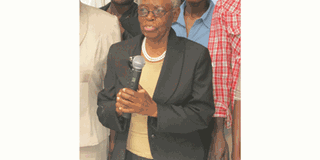Dr Sarah Nyendwoha Ntiro: The story of a Ugandan Rosa Parks

Dr Ntiro at the last Dr Sarah Ntiro Lecture and Award Event held last month. It was initiated by FAWEU in 2000 to celebrate her achievements. Photo by Abdu Kiyaga.
What you need to know:
Determination. When a lecturer at Makerere University set the ultimatum that Ntiro leaves the lecture room or he leaves, it was not because she did not qualify to be that class but rather because she was a woman. This became the incident in her life that influenced her subsequent efforts to spearhead the education of the Uganda girl child, writes Brian Magoba
In the age before “a woman’s place is in the kitchen”, officially transformed into “a woman educated is a nation trained”, imagine if you will, a schoolgirl in Bunyoro-Kitara and at King’s College Budo, doing corrections in mathematics with her schoolmates in what then was a male-dominated field. The said school girl in this case is today Dr Sarah Nyendwoha Ntiro.
When Ntiro joined Makerere College, the luminary aspect of her attitude to life came through in an incident which must have significantly influenced her subsequent efforts at spearheading education for Ugandan girls in particular. Taking her place in the lecture room, the male Maths lecturer advised her to ask for and go to where ‘female’ courses like knitting and tailoring were taught.
Like the African-American woman Rosa Parks whose action in refusing second-class treatment when ordered to the back of the bus in segregationist America inspired a revolution, Ntiro held her ground. The impasse ended with the lecturer walking out, issuing an ultimatum that he would not teach while she polluted his class with her presence. The revolution whose ignition she would cheerlead had just gained more kindling.
More scrapes with the patriarchal system were still headed her way. Years later she would refuse to be paid less than her similarly-qualified male counterparts with the same work load. She offered the radical choice of working for free rather than putting up with the gender-discrimination imposing financial inequality on her abilities. It took the intervention of Ms Anne Cohen, wife of then Colonial Governor Sir Andrew Cohen, to restore parity.
At the time though, only out of consideration for her classmates did she change to History, Geography and English, and it is qualifications in those subjects that she took with her to Kyebambe Girls School after graduating in 1950. The 1950-51 class she taught was only the pioneer generation of the multitudes of other girls whose education and lives she would come to influence, both directly and indirectly.
A woman of ground breaking achievements
While teaching, she also became a student of Latin, studying with clergymen based in Bunyoro-Kitara, before attempting the proficiency test at Fort Portal’s Virika Mission. Her results made the cut for admission to Oxford’s St. Anne’s College, and from then on, she solidified her reputation for being a woman of ground-breaking achievements of the type that affirm the resilience of the human spirit.
In 1954, she returned to Uganda, triumphant as the first woman in East and Central Africa to graduate from Oxford. The ripple-effect of this accolade would span decades of awards designed to celebrate her effect on mainly education-related issues, as well as her direct and indirect influence as a role-model for Ugandan girls battling the odds to get a meaningful education.
Just the next year, Makerere would realise it’s first female graduate in Eunice Lubega Psonansky, no mean feat for a varsity whose “Let Us be Men” motto at its inception in 1922 had only been changed to “We build for the Future” in 1945, the year females were granted admission. In Sarah Ntiro, the right person was at the right time and place to add momentum to the gains for girl’s education signaled by Makerere College’s change in attitude.
Exerting her influence on the system
At home, she started the Teaching Service Commission in 1965 before it became the Education Service Commission, taught at Gayaza High School, and was one of two women on the Uganda Legislative Council. In these positions she exerted her influence to standardise education practices, and passed on her faith in the validity of girl’s education to her students at Gayaza High School. Even exiled to Nairobi in 1978, she did not stop her advocacy for education, establishing an Education Consultancy of Higher Education for African Refugees. Family planning, associations of university women, alliances of young Christian women, name it and if it has anything to do with education or women’s issues, or a combination of both, she probably initiated it or was the motivation for it.
For instance, there is now a Sarah Ntiro Girl’s Vocational Secondary School in Hoima, a government-aided effort to instill in other girls some of the spirit that got her to the place where the Foundation of Activists for Women’s Education in Uganda (FAWEU) saw fit to bestow upon her a Woman of Distinction Award for using her achievement and status to promote girl’s education.
She shares the distinction with other movers and shakers like Lady Sylvia Nagginda, Justice Julia Sebutinde, Ms Rebecca Kadaga, Dr Speciosa Wandera Kazibwe, and Ms Angelina Wapakhabulo. FAWEU later felt that even with company of such pedigree, her efforts deserved more personal appreciation.
Thus the Dr (courtesy of a honorary doctorate from Spellman College in Atlanta, Georgia) Sarah Ntiro Lecture and Award Event was first held on December 12, 2000, at the Kampala International Conference Centre. The goal of the award was to use it as another platform to celebrate achievements in girl’s education and highlight challenges of bringing education to more and more girls. But, inspite of or because of the fact that women’s achievements in education are still cause for celebration, she would probably analyse the cause, and her efforts thus far in steering it, with a phrase from the Latin she speaks; aluta continua.




